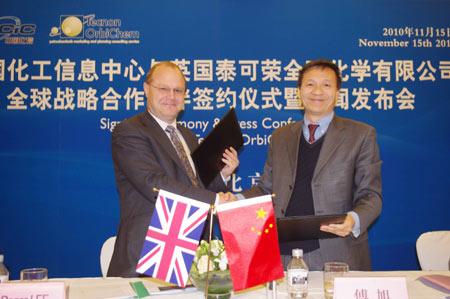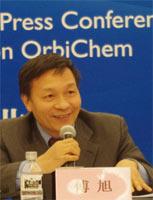
Fu Xu, director of CNCIC, and Roger Lee, managing director of Tecnon OrbiChem, shake hands after signing a Memorandum of Understanding in Beijing to formalize the two firms' partnership, Nov 15. [Photo/ Provided to chinadaily.com.cn]
China National Chemical Information Center (CNCIC) and London-based chemical consulting firm Tecnon OrbiChem said on Monday that they will partner on a new study of the methanol-to-olefins (MTO) business using coal as a feedstock.
The two consulting firms signed a Memorandum of Understanding in Beijing Monday afternoon to formalize their partnership that began several years ago.
Fu Xu, director of CNCIC, said the two institutions will work together to increase their global influence and sharpen their core competitiveness.

Fu Xu, director of CNCIC [Photo/ Provided to chinadaily.com.cn]
They will share marketing channels, seeking opportunities in Europe and China, and build a marketing and technology information exchange platform for Chinese and European chemical enterprises, Fu said.Beijing-based CNCIC is China's leading information provider for the chemical industry, while Tecnon OrbiChem is one of Europe's leading consulting firms specializing in the industries of bulk chemicals, petrochemicals and plastics.
The latest agreement came because CNCIC and Tecnon OrbiChem consider the time opportune to review the entire field of MTO and methanol-to-propylene initiatives in China.
"Something quite unique is happening in the chemical industry in China in the use of coal as a feedstock for chemicals," Roger Lee, managing director of Tecnon OrbiChem, said at a briefing on MTO following the signing ceremony.
CNCIC and Tecnon OrbiChem will look at which of and how soon the new ventures will become commercial realities, and what impact these initiatives will have on China's olefins industry, Lee said.
As world crude prices kept rising in recent years, the chemical industry, which uses petroleum as its basic feedstock, was seeking to reduce costs by looking at the possibility of using coal as a feedstock, Lee said.
 New energies to lead copper growth>
New energies to lead copper growth> 

